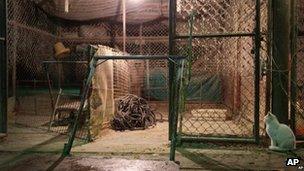China steps up bird flu precautions
- Published

Cages at three Shanghai poultry markets are empty after stalls were ordered to close
China is stepping up its efforts to contain the spread of a new strain of bird flu which has killed six people in the country.
The authorities in Shanghai, where four deaths were recorded, have closed three poultry markets and banned the import of all live birds into the city.
China has now identified 16 domestic cases of the H7N9 virus.
The World Health Organization says there is no evidence yet that the virus is being transmitted between humans.
The human cases of H7N9 have all occurred in eastern China, in Shanghai and its neighbouring provinces of Anhui and Zhejiang.
The latest death was a 64-year-old man who died in Zhejiang, the second death there, state media report. There was no sign of infection in anyone who had had close contact with him, said officials.
On Thursday, officials began the slaughter of at least 20,000 birds in Shanghai after the virus was detected in pigeons sold in Huhuai market.
The trading of live birds - how poultry is traditionally sold in China - has also been halted at a market in the Zhejiang city of Hangzhou, after the virus was detected in quail being sold there.
"People are worried," Yan Zhicheng, an elderly Shanghai resident, told AFP news agency.
"Shanghai people eat a lot of duck and chicken. Now we can't touch them."
Another Shanghai resident, Shao Linxia, said she would not longer be buying food from traditional markets, but instead using large supermarkets.
"I don't think it is safe to visit the wet markets anymore," she told Reuters.
The authorities in Hong Kong are also bringing in extra precautions, including heightened checks at immigration points, while other countries in the region have boosted their own influenza responses.
The H7N9 is a form of avian flu not previously been found in humans. The WHO says , externalinformation about it is still limited, but that all the victims have had severe pneumonia, with symptoms including a fever and shortness of breath.
It is also not yet known how all the infections occurred, with the WHO unable to confirm any cases of human-to-human transmission.
The Chinese government has promised to openly share information about the virus, after being accused of trying to cover up health crises in the past.
- Published5 April 2013
- Published5 April 2013